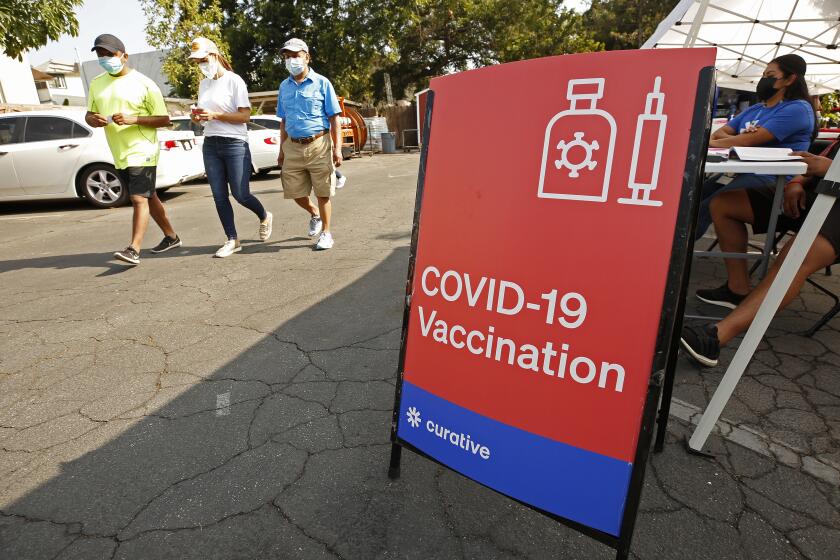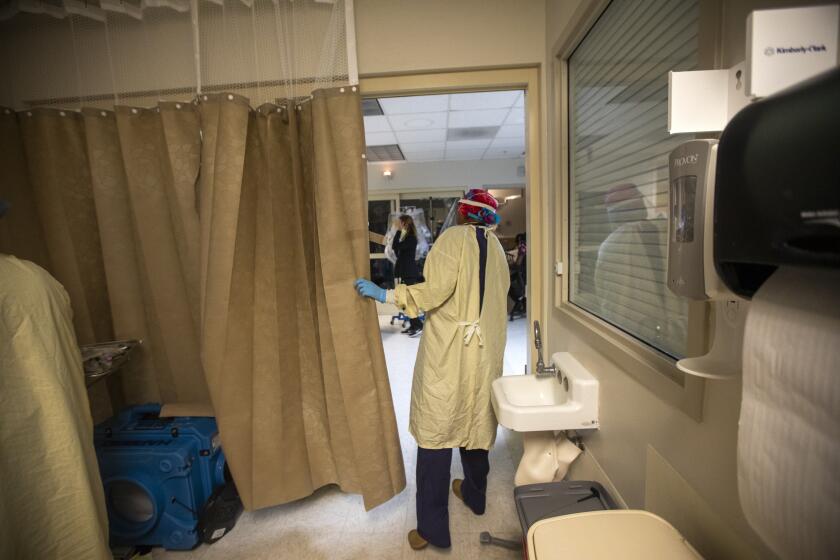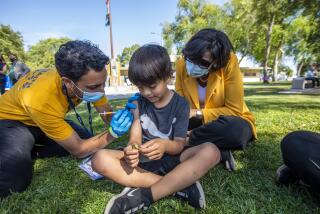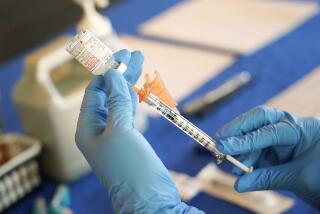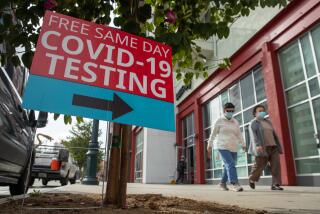More protection: U.S. likely to authorize COVID booster shots
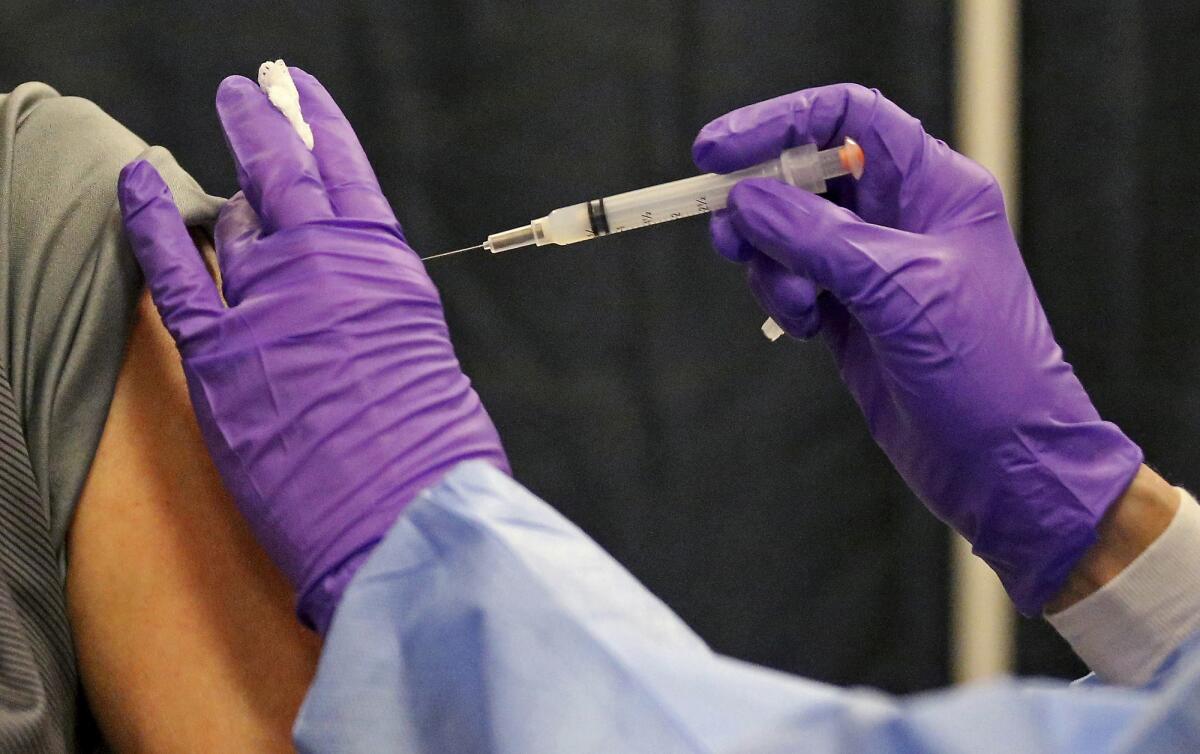
- Share via
WASHINGTON — After struggling for months to persuade Americans to get vaccinated against COVID-19, U.S. health officials could soon face a fresh challenge: talking vaccinated people into getting booster shots to gain longer-lasting protection as the Delta variant sends infections soaring again.
As early as this week, U.S. health authorities are expected to recommend an extra dose of vaccine for all Americans eight months after they get their second shot, according to two people who spoke to the Associated Press on condition of anonymity to discuss internal deliberations.
That means the biggest vaccination drive in U.S. history is about to get even more extensive.
The move is being driven by both the highly contagious Delta variant and by preliminary evidence that the vaccine’s protective effect starts dropping within months.
The urgency from U.S. officials reflects how quickly the variant has knocked the country on its heels. On the Fourth of July, President Biden proclaimed that the U.S. was declaring its independence from the virus. But since then, infections, hospitalizations and deaths have increased nationwide, overloading emergency rooms across parts of the South and West.
When Pfizer announced plans in July to apply for approval for COVID-19 booster shots, U.S. officials said it was too early to know whether they were needed. Experts worried that a new campaign would muddle efforts to win over the tens of millions of Americans who are skeptical or hesitant to get even their first dose.
“We have to really make sure that while we’re spending a lot of time and effort on third doses that we don’t undermine our campaign for first vaccinations,” Lawrence Gostin, a public health specialist at Georgetown University, said Tuesday. “That’s truly the existential crisis in the United States.”
Calling for third doses could discourage people who had been skeptical of the shot’s effectiveness in the first place, Gostin warned.
Booster shots would only begin to be administered widely once the Food and Drug Administration formally approves the vaccines, which are being dispensed for now under an emergency use authorization. Full approval of the Pfizer-BioNTech vaccine is expected in the coming weeks.
Last week, U.S. health officials recommended boosters for some people with weakened immune systems, such as cancer patients and transplant recipients.
The director of the National Institutes of Health, Dr. Francis Collins, said Sunday that the U.S. could decide in the next couple of weeks whether to offer booster shots this fall to other Americans as well.
Among the first to receive them could be healthcare workers, residents of nursing homes and other older Americans, who were some of the first to be vaccinated after the shots were authorized last December.
Nearly 199 million Americans, or 70.1% of those who are eligible, have received at least one dose of a COVID-19 vaccine, according to the Centers for Disease Control and Prevention. Just under 60% of Americans age 12 and older are fully vaccinated.
The vaccination drive has been slower than the Biden administration had hoped. At the same time, the Delta variant is spreading aggressively through unvaccinated communities and causing an increasing number of “breakthrough infections” of fully inoculated people.
Unleashing a fast-spreading coronavirus variant on a half-vaccinated population can lead to a vaccine-resistant strain.
Studies show that the vaccine remains highly protective against severe COVID-19, but results from Israel released last month suggest that its potency wanes. Its effectiveness against symptomatic infection peaked at 96% two months after study participants got their second dose. Four months later, it was down to 90%. By six months, it was about 84%.
Israel, which exclusively administered the Pfizer-BioNTech shot, has been offering a booster to people over 50 to control the country’s Delta surge. Researchers are trying to understand to what extent the breakthrough infections are due to waning immunity, as opposed to the increased transmissibility of the Delta variant.
On Tuesday, European medical regulators said they were talking with vaccine developers about the need for boosters but haven’t made any decisions.
On Monday, Pfizer and BioNTech announced that they submitted data to the FDA to support authorizing a booster shot for the general public. Pfizer said a small study showed that people who received a third dose had higher levels of antibodies against several versions of the coronavirus, including the Delta variant. The company is working on a larger study.
Americans who received the earliest doses of Pfizer’s vaccine — mainly healthcare workers and residents of nursing homes — are approaching the eight-month mark from when they received their second dose.
“There is a concern that the vaccine may start to wane in its effectiveness,” the NIH’s Collins said. “And Delta is a nasty one for us to try to deal with. The combination of those two means we may need boosters, maybe beginning first with healthcare providers, as well as people in nursing homes, and then gradually moving forward.”
Op-Ed: As a doctor in a COVID unit, I’m running out of compassion for the unvaccinated. Get the shot
A doctor featured in a Times article published Sunday on the latest wave of COVID-19 speaks for herself in a searing letter to unvaccinated people.
He said because the variant started hitting the country hard in July, the next couple of weeks of case data will help the U.S. make a decision.
The Pfizer-BioNTech vaccine and a similar one from Moderna are administered in two doses. Officials are continuing to collect information as well about the single-dose Johnson & Johnson vaccine to determine when to recommend boosters.
The White House has said that even though the U.S. has begun sharing more than 110 million vaccine doses with the rest of the world, there is enough on hand to deliver boosters to Americans.
Global health officials, including the World Health Organization, have called on wealthy countries with high levels of vaccinations to hold off on booster shots for those who are fully vaccinated to ensure enough supply of first doses for people in poorer areas.
Gostin said any Biden administration plan to recommend boosters for all Americans would be “a slap in the face” to other nations that haven’t yet been able to vaccinate their most vulnerable people.
“It’s tone-deaf to the rest of the world that can’t even get any doses,” he said.
More to Read
Sign up for Essential California
The most important California stories and recommendations in your inbox every morning.
You may occasionally receive promotional content from the Los Angeles Times.
